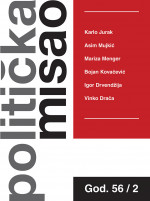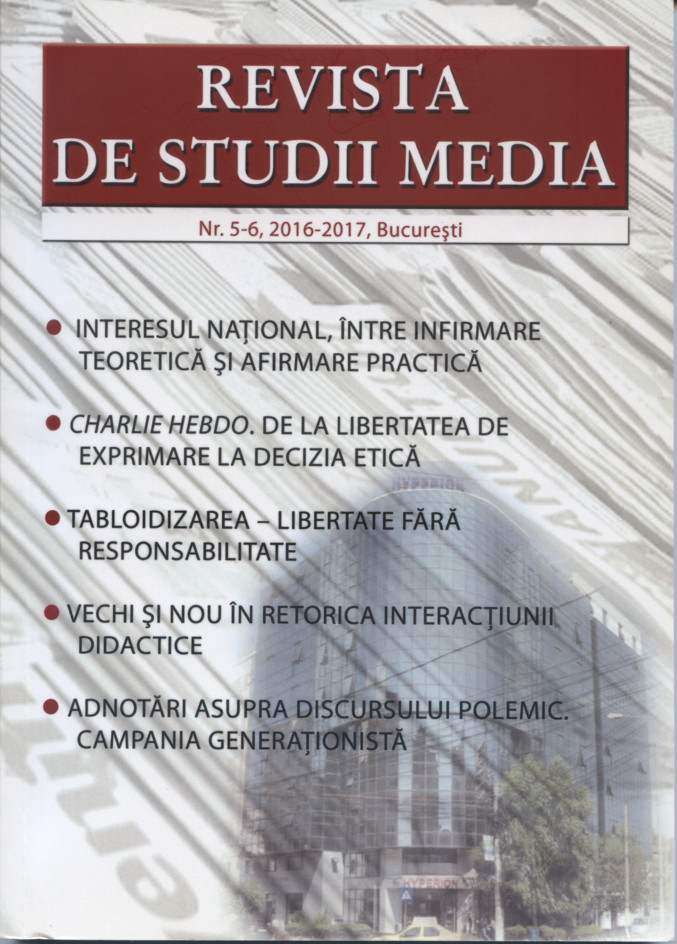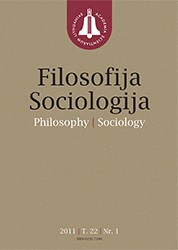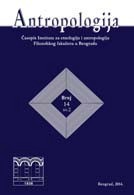
SOCIOLOGIJA I ŠKOLA
Raspravljamo još jednom, a oni koji sve ovo prate pitaju se koji je to put, o programu predmeta opštepoznatog pod nazivom marksizam.
More...We kindly inform you that, as long as the subject affiliation of our 300.000+ articles is in progress, you might get unsufficient or no results on your third level or second level search. In this case, please broaden your search criteria.

Raspravljamo još jednom, a oni koji sve ovo prate pitaju se koji je to put, o programu predmeta opštepoznatog pod nazivom marksizam.
More...
Oslanjajući se na dostignuća svetskih sociologa, metode koji su primenjivani u razvijenijim zemljama, prilično šematizovanu nastavu marksizma i istorijskog materijalizma na našim univerzitetima i sve izrazitiju artikulaciju društvenih potreba za takvom naukom, sociologija se 1959. konstitusala u samostalnu akademsku disciplinu na Beogradskom univerzitetu, otvaranjem prve sociološke kataedre u zemlji.
More...
Review of: PETAR PRVULOVIĆ - Stanko Ilić, "Put u humano društvo", "Ekonomika", Beograd, 1984.
More...
Fromm's specific scientific method developed from the attempt to integrate marxism with psychoanalysis. This unusual approach evolved from the basic postulate of his worldview, that is, the center of the world, society and science is the human being defined by the complex joteracBon of its biological, psychological, antropologlioal and philosophical essence.
More...
In this work the author is concerned with problems arising with regard to the humanization of labor under the conditions of a growing scientific-technical progress.
More...
Review of: Bratislav Petrović - Dr Petar Kozić, MARKSIZAM I TEME SAVREMENOG DRUŠTVA, Beograd, 1980.
More...
To begin with, the author discusses Homans, Pareto and Parsons concepts of social equilibrium, noting that the theory of change in functionalism is broader than the theory of equilibrium. The notion of social equilibrium narrows down Parsons evolutionism. Farson is in favour of giving equal importance to' »dynamics«, and »statics)’, altough this is not in conformity with the view that every change must be preceded by a state of equilibrium.
More...
In the period after the World War Two the problems of social change and development were neglected both in the West and in the East sociology, and the characteristic of this period was engagement mostly in the problems of social structure (»social statics«). In the sixties the situation changes in the bourgois sociology and greater interest is taken in problems of »social dynamics«. The same thing is happening in this country lately.
More...
Jovan Cvijić and Sreten Vukosavljević rank among the autstanding representatives of our traditional and, at the same time, empirical and inductive sociology. Their scholarly contribution has frequently been emphasised but quite rarely with attempts to portrait these two personalities.
More...
As in many other countries in USA the marxist approach in the studies of urban problems has been very popular since the begining of the seventhies. Here, the Marxist thought is developing within two streams — radical (Marxist) geography (Harvey) and radical urban political economy (Tabb, Sawers, Molenkopf, Hill, Gordon, K. Koit and the others), but multidisciplinary orinetation is carasteristical for them as for the Marxist analysis of urban processes in general. This paper deals mainly with the sociological aspects of those researches.
More...
Teoretičari »kraja ideologije« nastojali su pedesetih i početkom šezdesetih godina da izgrade novu političku terminologiju, koja bi primerno izrazila »novi« način mišljenja. Misliti i danas u terminima »kapitalizam i socijalizam«, »buržuji i proleteri«, »jednakost i nejednakost«, »levica i desnica«, znači, prema njihovom gledištu, podržavati stari i prevaziđeni stil rasuđivanja, koji je vreme definitivno pregazilo.
More...
U svom zanimljivom i inspirativnom »čitanju Магха«, Habermas polazi od Marxove kritike Hegela, 'da bi se, na kraju, sam vratio Hegelu, utvrđujući da u razmatranju »prirodno-istorijske samokonstitucije ljudskog roda« pojam sinteze »mora da dobije drugu dimenziju« u odnosu na onu što je ističe Marx. Po Habermasu, Marx uvodi posredovanje radom, dok sinteza mora biti posredovana »samorefleksijom pojavljujuće klasne svesti« — da bi ona bila dijalektička, a takav model nudi jedino Hegel (str. 93 i 96).
More...
Marxist theory, as all other theories, is subject to the consequences of the division of labour into the material and the mental one. In The German Ideology Marx marked this division as the first real division of labour in class societies. Regarding Marxism itself, the consequences of this division are very obvious especially within the phenomenon of so-called Western Marxism, but most of all in post-Marxist transformations. Therefore, the aim of this paper is to apply the method of historical materialism to post-Marxism itself and to describe and explain the transformations of revolutionary subjectivities which follow this mutation in Marxist theory. Before that, it is necessary to roughly outline the periodization of Marxism relying on some terms coined by Perry Anderson and, on that trajectory, to present post-Marxism as the second phase of Western Marxism. Thus, the central part of the paper focuses on the main characteristics of post-Marxism such as replacement of class politics with identity politics, the particularisation and fragmentation of social struggles, and their cooptation in the dominant socio-political framework. All of that is accompanied by remarks on some changes in the relations of production and the concomitant neoliberal turn in the economic, political and cultural agenda. In order to allow for a better understanding of it all, a short review of some post-Marxist forerunners and theoretical concepts which have noticeably influenced post-Marxist theories is offered. This is followed by explanations of the most prominent examples of the constitution of different revolutionary subjectivities in some post-Marxist theories. Finally, the necessity of overcoming these particular positions and theoretically affirming universalism, including its practico-political importance and potentiality, is emphasized. This paves the way for the return to the historical sources of Marxism, which are what allowed for its auto-reflexivity in the first place.
More...
Djelo njemačkog filozofa Waltera Benjamina (1892-1940) obuhvaća raspon od knjiga iz teorije umjetnosti o njemačkom romantizmu i baroknoj žalobnoj igri do nedovršene studije o devetnaest stoljetnom Parizu, tekstova nadahnutih religijom i politički usmjerenih tekstova. Intelektualn utjecaji na njegovu filozofiju u cjelini su raznovrsni: židovski mesijanizam, historijski materijalizam, modernizam i nadrealizam. Njegov tekstovi o filmu primjer su za ovo »Janusovo lice« (Scholem 1981:197) te su i dalje iznimni po svojoj sposobnosti kombiniranja osnovne marksističke perspektive s uvidima u narav i recepciju filma koji su relevantni izvan marksističkog političkog konteksta. [...]
More...
Qu’est-ce qui determine objectivement la planification des villes? Par quoi la fonction de Turbaniste est-elle marquee? Quel est son role social? En quoi consistent Tideologie et J'illusion des urbanistes.
More...
The following article deals with Emanuel Copilaș’s interpretation of Leninism as a key concept in explaining altogether the foreign policies, the roots of Nicolae Ceaușescu’s nationalism in the 1970-1980’s and the social effects of the economic and social policies of the communist regime after 1965 in Romania. Since Emanuel Copilaș focuses largely on the factual concreteness of ideological thinking inasmuch as ideology itself is posited as outside reality, but capable of altering the same reality from within, our analysis draws on the Marxist criticism that could be made to any ideology, including the varieties of Leninism identified or just utilized by Emanuel Copilaș. Hence, we will attempt to subvert and negate the very possibility of any ideological construct to be separable from the social praxis it pretends to radically change. Finally, the place of real social relations will be referred to as the nexus of all fetishistic ideological viewpoints, which may carry a high degree of truth, as long as this truth has been already present in the fabric of social exchange, private consumption and material production.
More...
The following conceptions are investigated and criticised; those of M. Seeman, M. Scott, G. Nettler, K. Keniston, etc. The main remarks briefly formulated are: 1) in the works criticised different theoretical conceptions and different notions of alienation are combined and their meanings confused; therefore, radically different contents are arbitrarily subsummed under the term “alienation”; 2) from this reason they are being eclectic, without the authors'clearly determined theoretical position the concept of alineation is incorrectly extracted from its original theoretical frame of reference, and particular dimensions, fitting the intended explanation, are arbitrarily chosen from different theoretical sources; 3) and this (i. e. nondefined theoretical position) has been excused by 'the authors’ “modest” intention for achieving an operationalization of the concept;
More...
The liberation theology is one of the most prominent cases where the socio-political and religious ideas have been intertwined so tightly that it has allowed defining its activities as both a religious and a socio-political movement. The article will give a brief insight into the history of liberation theology, with more attention to the early stages of its formation, the documents adopted at the Medellin Conference. The attitude of liberation theology and its representatives to the Marxist ideology and relations with the left wing movements in Latin America is also highlighted.
More...
The article is devoted to the identification of some intersection points in the philosophical ideas of F. Nietzsche and V. Lenin. The analysis of Lenin’s views, given by Louis Althusser in a number of his works, can serve as the methodological basis for such a comparison. In this perspective, Lenin’s understanding of philosophy is characterized by the fact that philosophy is treated not only as a theory but, above all, as a practice of struggle for domination. Lenin and Nietzsche share the dynamic view of the universe, the idea of the leading role of contradictions and struggle in the world’s being. Philosophy appears as an expression of some hidden impulses, which are ultimately reducible to the will to power. Therefore, for both thinkers knowledge appears not as the result of pure and objective cognition, but as a product of the struggle of power instincts, and knowledge itself is a necessary element of any power order.
More...
This paper offers a systematization of the theoretical presuppositions and conclusions in the Marxist studies of zadruga – its model, structure and genesis - which could later be subject to analysis and interpretation. The systematization of the model was based on the ideotypical description of the supposedly prevalent model of zadruga (fraternal), its structures and terminology of kinship, economic foundations, as well as its relicts in social structure, practice and symbols. After that, the model was analyzed and juxtaposed with findings in social anthropology and linguistics
More...